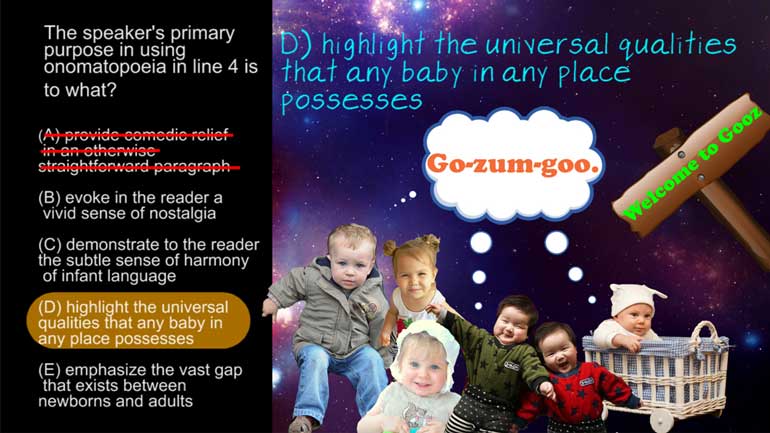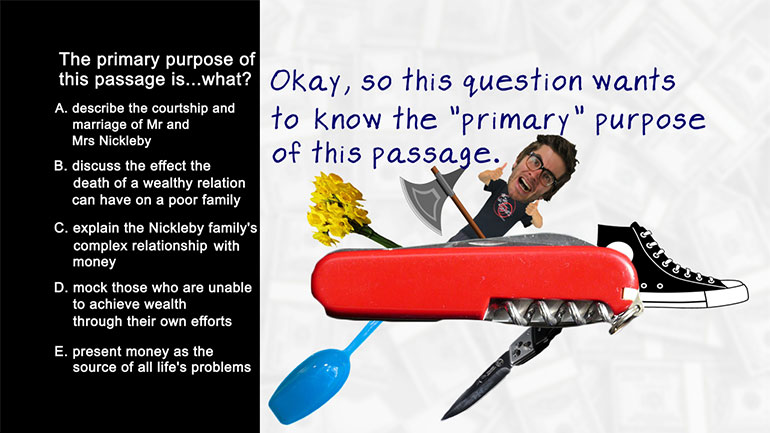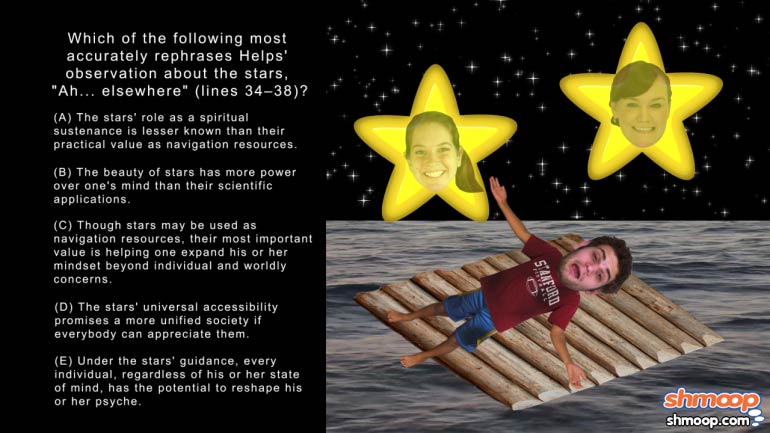ShmoopTube
Where Monty Python meets your 10th grade teacher.
Search Thousands of Shmoop Videos
AP English Language and Composition 6.2 Passage Drill 190 Views
Share It!
Description:
AP English Language and Composition 6.2 Passage Drill. The sentence beginning with "We Desire..." is an example of what type of syntax?
Transcript
- 00:00
Sorry And here's your smoked you sure brought to you
- 00:05
by abraham lincoln and his gettysburg address You'd appreciate it
- 00:09
If you'd stop forming is male there Let's take a
- 00:11
look following passage right there huh Eric work of nature
- 00:22
and here's Our question The sentence beginning with we desire
Full Transcript
- 00:26
is an example of what type of syntax And here
- 00:29
the potential answers Five dollars work well while some might
- 00:36
consider syntax the amount of money they leave in the
- 00:38
collection plate at church it's actually the sequence in which
- 00:41
words are put together to form sentences or in other
- 00:44
words the rules that dictate sentence structure Let's take a
- 00:47
look at a the authority a week Well according to
- 00:50
the great big book of syntax the off storia we
- 00:53
is a device an author or public speaker might use
- 00:56
to try and bond with their audience by suggesting that
- 00:58
they all share the same goal or belief Well in
- 01:02
this passage the author seems to suggest that we the
- 01:04
readers are just as dedicated about finding certain things Is
- 01:08
he is except it's funny The author never actually asked
- 01:11
us his readers if those were our desires or not
- 01:15
truth be told we usually desire a cheeseburger and milkshake
- 01:18
a little bit more than the conditions of character in
- 01:20
an artist According to the explanation above the author did
- 01:23
use the authority a week's Now that we know is
- 01:27
either the only right answer or part of the writing
- 01:29
of certain we can eliminate answer Eat b s about
- 01:33
parallel construction Well again referring to the holy grail of
- 01:36
syntax parallel construction is the repetition of the same pattern
- 01:40
of words or phrases within a sentence or passage to
- 01:43
show that two or more ideas have the same level
- 01:45
of importance Great So what does that mean Well a
- 01:49
quick and easy example would be the demands that toddler
- 01:51
might make of his older brother or sister In fact
- 01:54
the older sibling might want to add the parallel construction
- 01:57
with the demand of our own But unfortunately not typically
- 02:00
appreciative of such Anyway Getting back to the passing the
- 02:04
author uses the phrase we desire three times and in
- 02:07
each case is to give the same level of importance
- 02:10
to a new concept the author is interested in finding
- 02:13
so again according to a grand rulebook of syntax the
- 02:16
author is using parallel construction now the beautiful thing about
- 02:20
this discovery is that we now have two answers that
- 02:22
are accurate which means we can safely assume that the
- 02:25
correct answer is b lucky us Now we don't have
- 02:28
to bother learning that unnatural is the repetition of a
- 02:31
word or phrase at the beginning of success of klaus
- 02:35
Nor do we Have to learn about how abraham lincoln
- 02:37
used a naff ra in the gettysburg address Uh well
- 02:41
i guess we just did some extra work It's Okay
- 02:43
though we love extra worked here in months like four
- 02:45
score and seven years ago we started this question Shmoop
Up Next
AP English Language and Composition: Passage Drill Drill 1, Problem 2. What is the speaker's primary purpose in using onomatopoeia in line four?
Related Videos
AP English Literature and Composition 1.1 Passage Drill 7. The primary purpose of this passage is what?
Wishing upon a star may help you pass your AP English Language and Composition test, but answering this question would be a safer bet.
Take a look at this shmoopy question and see if you can figure out which device the speaker employs the most.
Feel like shifting gears and answering a question about shifting tones? We've got you covered. Take a look at this question and see if you can foll...




